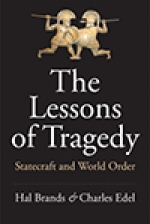 Two leading commentators fret that “the U.S.-led international order has been so successful for so long, that Americans have come to take it for granted,” Max Boot writes for the Washington Post:
Two leading commentators fret that “the U.S.-led international order has been so successful for so long, that Americans have come to take it for granted,” Max Boot writes for the Washington Post:
Historians Hal Brands and Charles Edel note in their new book “The Lessons of Tragedy: Statecraft and World Order” that in the 1,000-year period between 900 and 1900, England was involved in some type of war in 56 out of every 100 years, and Russia experienced only a single quarter century of peace. Just between 1648 and 1789, the European powers fought 48 wars, “with some of them — the War of the Spanish Succession from 1701-1714 and the Seven Years’ War from 1756-1763 — being world wars in all but name.”
The “Unipolar Moment” may be long gone, but there is no viable alternative to U.S. leadership to defend the international rules-based order, a veteran diplomat suggests.
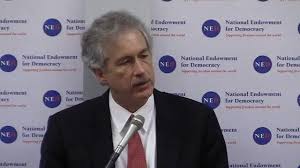 The United States is no longer the singular dominant power that we were just after the Cold War, but we’re still the pivotal player, argues William J. Burns (right), a former deputy secretary of state and ambassador to Russia. We still have a window of American pre-eminence before us, in which we can help shape international order to safeguard our interests and values, before others shape it for us, he writes for the New York Times:
The United States is no longer the singular dominant power that we were just after the Cold War, but we’re still the pivotal player, argues William J. Burns (right), a former deputy secretary of state and ambassador to Russia. We still have a window of American pre-eminence before us, in which we can help shape international order to safeguard our interests and values, before others shape it for us, he writes for the New York Times:
What that requires is the revival of American diplomacy as our primary tool for navigating a more crowded, complicated and competitive world. That will not be easy. Diplomacy is among the oldest of professions, but also among the most misunderstood. It is by nature an unheroic, quiet endeavor, often unfolding in back channels out of sight and out of mind. Crises averted are less captivating than military victories; diplomacy’s preventive care is less compelling than the military’s surgical feats.
Should democracy promotion be the preserve of non-governmental organizations? As during the Cold War, “a certain restraint is again crucial to conserving a free and open international order,” argues Peter Berkowitz, the Tad and Dianne Taube senior fellow at Stanford University’s Hoover Institution.
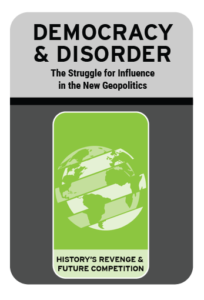 With the decline of U.S. leadership, a weakening Europe, and the rise of authoritarian China and Russia, the future of the liberal order depends on newer democratic powers picking up the slack, argues Brookings analyst Ted Piccone. Leading players such as India, Brazil, South Africa, the Republic of Korea, Indonesia, and Mexico are capable of playing a more active role to sustain a global cooperation agenda favoring open democratic societies, he contends.
With the decline of U.S. leadership, a weakening Europe, and the rise of authoritarian China and Russia, the future of the liberal order depends on newer democratic powers picking up the slack, argues Brookings analyst Ted Piccone. Leading players such as India, Brazil, South Africa, the Republic of Korea, Indonesia, and Mexico are capable of playing a more active role to sustain a global cooperation agenda favoring open democratic societies, he contends.
“Many of these countries, however, face significant political and economic challenges of their own,” he adds. “If geopolitical competition intensifies, they may choose to sit on the fence or accept lowest common denominator outcomes for the sake of avoiding outright economic or military conflict. Liberal democracy and human rights, in this scenario, will erode further.”
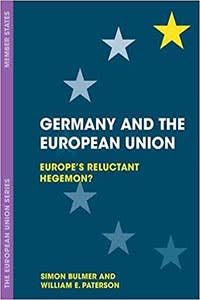 The chief risk that faces Europe is that the EU, a pillar of the liberal order that Germans built at home and supported abroad, might come under existential threat, Simon Bulmer and William E Paterson argue in Germany and the European Union: Europe’s Reluctant Hegemon? The repercussions for Germany could be immensely serious and spill across Europe, the FT’s Tony Barber adds. The EU has never had to face a crisis “made in Germany”, the authors say, but “the potential for that is now greater than before”. The reviewer is the FT’s Europe commentator Germany and the European Union: Europe’s Reluctant Hegemon? by Simon Bulmer and William E Paterson
The chief risk that faces Europe is that the EU, a pillar of the liberal order that Germans built at home and supported abroad, might come under existential threat, Simon Bulmer and William E Paterson argue in Germany and the European Union: Europe’s Reluctant Hegemon? The repercussions for Germany could be immensely serious and spill across Europe, the FT’s Tony Barber adds. The EU has never had to face a crisis “made in Germany”, the authors say, but “the potential for that is now greater than before”. The reviewer is the FT’s Europe commentator Germany and the European Union: Europe’s Reluctant Hegemon? by Simon Bulmer and William E Paterson
The international liberal order was “tasked with the prevention and management of the main crises” while “the transition towards a free market economy and democracy seemed like an unstoppable process,” notes Alessandro Colombo, Professor of International Relations at the University of Milan.
“Now both processes have ground to a halt. The international order is not working as it used to, as exemplified by the catastrophic example of Syria; and liberal democracies are going through a growing crisis of legitimacy.”
“I think what’s really interesting right now is that we sort of opened up the debate in the public about whether or not we still want to adhere to this rules-based or liberal international order that Americans created and led for the past seventy years,” says James M. Lindsay, Senior Vice President and Director of Studies at the Council on Foreign Relations.
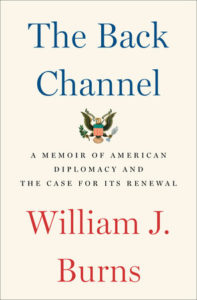 There are at least three imperatives to restoring U.S. diplomatic leverage, adds Burns, the author of The Back Channel: A Memoir of American Diplomacy and the Case for Its Renewal and a National Endowment for Democracy board member:
There are at least three imperatives to restoring U.S. diplomatic leverage, adds Burns, the author of The Back Channel: A Memoir of American Diplomacy and the Case for Its Renewal and a National Endowment for Democracy board member:
- First, we have to recapture the fundamentals of diplomatic tradecraft. Diplomats have been overwhelmed by existential angst, trying desperately to prove they are more than just village watchmakers in a smartwatch world. ….Diplomats are classic organizers, harnessing all the levers of American influence, investing in alliances, mobilizing coalitions, endlessly adapting institutions and managing the gray area between peace and war. Even as the landscape shifts, the fundamentals — a nuanced grasp of history, mastery of foreign languages and facility in negotiations — remain indispensable.
- Second, we urgently need to build modern capabilities on top of that traditional foundation. Recent efforts at transformation have tended to focus on the capillaries of institutional change, rather than the arteries, more on how we look than how we work. We need to strip down the State Department’s bureaucracy and make it more nimble. We ought to invest heavily in 21st-century skill sets so that we can better compete in the new global economy, cope with global challenges like climate change and maximize the benefits of the revolution in technology while minimizing its disruptions.
- Third, we have to construct a new domestic compact between government and citizens about America’s role in the world, and the utility of diplomacy in this new era. As we near the end of the second decade of a military campaign in Afghanistan and continue to wrestle with the consequences of the war in Iraq, Americans are naturally exasperated about the costs in blood and treasure, and the indiscipline that all too often belies our rhetoric about disciplined leadership.
“We have to demonstrate that diplomacy* and international influence are aimed as much at enabling domestic renewal as they are at shoring up global order,” Burns concludes. RTWT
*On which subject, check out Bruce Gregory’s Institute for Public Diplomacy and Global Communication Resource Base at George Washington University.







